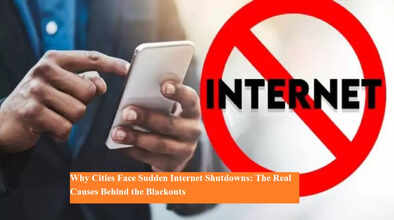Why Cities Face Sudden Internet Shutdowns: The Real Causes Behind the Blackouts

In today’s digital-first world, living without the internet seems almost impossible. From online classes and remote work to digital payments and travel bookings, internet connectivity has become the backbone of modern life. Yet, from time to time, entire cities suddenly go offline, leaving people wondering—why does this happen, and what technology allows it?
How the Internet Actually Works
At its core, the internet runs on fiber optic cables. These high-speed cables are laid deep underground and across oceans, transmitting trillions of data packets from one point to another within seconds. When one of these cables gets damaged, cut, or disrupted due to technical faults, the entire region relying on it may face a sudden blackout.
Sometimes, these disruptions are accidental, such as during construction work when underground cables are severed. In other cases, internet shutdowns are carried out deliberately—either by governments or service providers—through advanced network control technologies.
The Technology Behind Internet Shutdowns
Experts explain that shutting down the internet across a region is not as complicated as it may seem. There are two primary methods used:
-
IP Blocking: Access to specific websites, applications, or platforms is restricted. This means users cannot reach services like social media, messaging apps, or news portals, even if the internet connection itself remains active.
-
Kill Switch: A more severe step where telecom operators or authorities cut off signals at the network control level. This halts all online activity instantly, effectively disconnecting an entire city or state from the internet.
Why Do Shutdowns Happen?
There are two broad categories of internet shutdowns: deliberate and technical.
-
Government-imposed shutdowns
Authorities often restrict internet access during times of unrest, protests, or communal tensions. The idea is to prevent the spread of misinformation, stop rumors, and maintain law and order. Governments present these shutdowns as a temporary security measure to protect citizens from violence or panic. -
Technical disruptions
Not all blackouts are intentional. Sometimes, they are caused by:-
Power failures at major data centers
-
Server crashes affecting entire networks
-
Cyberattacks targeting telecom infrastructure
-
Accidental or intentional damage to fiber optic cables
-
Impact on Daily Life
A city-wide internet shutdown affects almost every aspect of modern living:
-
Digital payments stop – Transactions via UPI, cards, and mobile wallets fail, hitting both businesses and individuals.
-
Work and education suffer – Online classes, remote work, and virtual meetings come to a standstill.
-
Healthcare and emergency services struggle – Hospitals face delays in accessing critical data or coordinating with other facilities.
-
Businesses lose revenue – From e-commerce to logistics, industries dependent on connectivity face immediate losses.
The economic cost of even a few hours of disruption can run into millions. More importantly, it causes inconvenience to ordinary citizens who rely on the internet for everything from banking to basic communication.
Is There a Better Solution?
Cybersecurity experts argue that a complete shutdown is not an ideal solution. Instead, controlled or partial restrictions could be more effective. For example:
-
Temporarily blocking only social media platforms during sensitive situations, while allowing essential services like online banking and government portals to function.
-
Strengthening cybersecurity infrastructure to minimize the risks of large-scale technical failures.
-
Building redundant networks and backup systems so that a single cable cut does not paralyze an entire region.
Conclusion
Internet shutdowns highlight both the strengths and vulnerabilities of our digital ecosystem. While they may sometimes be necessary for security, their widespread impact shows why experts recommend alternatives such as targeted restrictions and better infrastructure.
In a world increasingly dependent on connectivity, ensuring uninterrupted and secure internet access is not just a convenience—it is a necessity.

